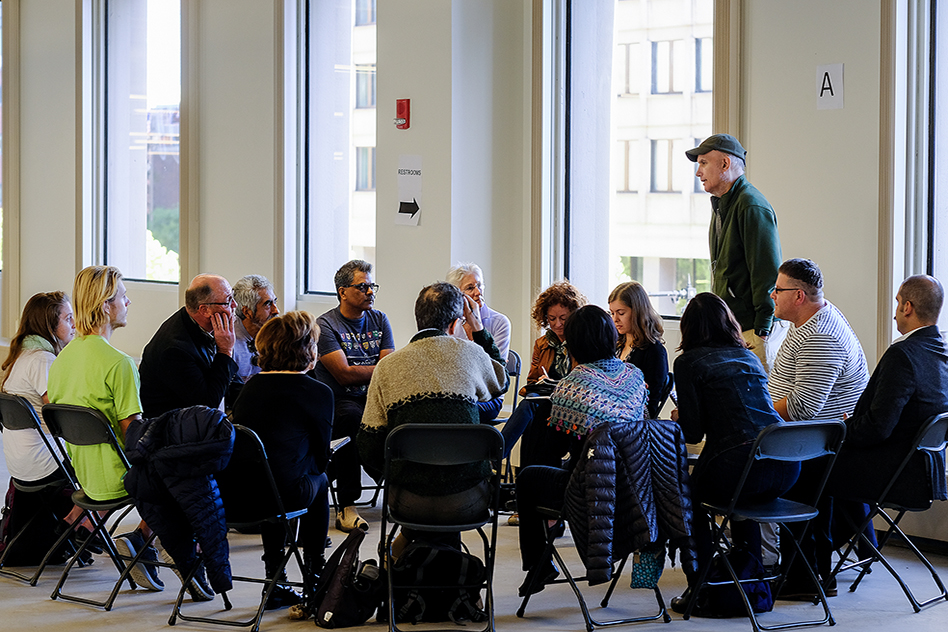
Perched on a circle of chairs in a well-lit room in an office building across from Boston City Hall Plaza on a Friday morning, 15 adults of all ages explored how best to enable citizens of Greater Boston to confront the risks posed by climate change. Participation was high, and for good reason: the topic for discussion—climate science, impacts and adaptation—had been crowd-sourced by attendees of Deep Dive: Open Innovation on Climate Change, one of several HUBweek events designed to bring people together to brainstorm possible solutions to major global and local challenges and build a better future.
Facilitating the conversation was MIT Joint Program Co-Director John Reilly, who had been invited by the organizer of the October 13 event, MIT Climate CoLab, to contribute his expertise on climate change. But as Reilly quickly learned, those who had joined his session were also quite well-informed on the issue. In just a half hour, the group floated several ideas on how to cope with local sea-level rise and flooding risks, from “hardening the coast” with shoreline-protective structures to requiring that states adhere to a set of standards for rebuilding after a flood in order to qualify for Federal Emergency Management Association (FEMA) funding.
One proposed solution that Reilly found particularly appealing was to develop curricula that empower young people to address climate risks that may escalate over time. “How is our educational system preparing young people for this way of thinking?” he said, noting that conventional public school offerings in household management, from home economics to personal finance, no longer suffice in the face of environmental change. “Is there a role for high schools to play to help students learn how to protect their households from natural disasters and make climate-smart decisions on where to purchase a home?”
Top ideas from the Deep Dive event, which also featured conversations on carbon pricing, carbon dioxide removal and other topics, were submitted to the Climate CoLab online platform for feedback from the crowd-sourcing organization’s global network of more than 85,000 people.
Reilly presented additional ways that the Boston area can prepare for the effects of climate change as a panelist at another HUBweek event, Future Forum: A Rising Tide. Held the following afternoon just outside of Boston City Hall, the forum offered perspectives from representatives of the City of Boston, the State of Massachusetts, the architecture industry and MIT.
Drawing on previous talks with the MIT Office of Sustainability, Reilly summarized the Institute’s five-layered approach to assessing vulnerability to/planning for sea-level rise and extreme precipitation and heat events. The strategy takes into account the campus’ geography (e.g. feet above sea level, distance to bodies of water), underground systems (e.g. sewage and drainage), utilities (e.g. electric power and communications), buildings and people (e.g. evacuation procedures).
One questioner raised concerns about implementing climate adaptation measures with limited financial resources. Reilly emphasized the value of using scientific understanding to prioritize those actions that are necessary to minimize climate impacts on the built environment, and to build proactively with climate change in mind.
“It may be expensive to prepare for the effects of climate change,” he said, “but it will be a lot more expensive to be unprepared and face potentially catastrophic damage.”
MIT Energy Initiative co-op Mary Potts contributed to this report.
Photo: MIT Joint Program Co-Director John Reilly (third from left) served as a facilitator for one of the group discussions on climate adaptation at Deep Dive: Open Innovation on Climate Change, one of several HUBweek events during the week of October, 9, 2017. (Source: MIT Climate CoLab)

